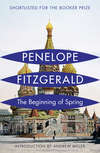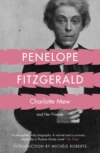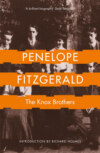Loe raamatut: «The Beginning of Spring»
The Beginning of Spring
PENELOPE FITZGERALD

Contents
Cover
Title Page
Preface by Hermione Lee, Advisory Editor
Introduction
1
2
3
4
5
6
7
8
9
10
11
12
13
14
15
16
17
18
19
20
21
22
23
24
25
26
27
Praise
Other Works
Copyright
About the Publisher
Preface by Hermione Lee, Advisory Editor
When Penelope Fitzgerald unexpectedly won the Booker Prize with Offshore, in 1979, at the age of sixty-three, she said to her friends: ‘I knew I was an outsider.’ The people she wrote about in her novels and biographies were outsiders, too: misfits, romantic artists, hopeful failures, misunderstood lovers, orphans and oddities. She was drawn to unsettled characters who lived on the edges. She wrote about the vulnerable and the unprivileged, children, women trying to cope on their own, gentle, muddled, unsuccessful men. Her view of the world was that it divided into ‘exterminators’ and ‘exterminatees’. She would say: ‘I am drawn to people who seem to have been born defeated or even profoundly lost.’ She was a humorous writer with a tragic sense of life.
Outsiders in literature were close to her heart, too. She was fond of underrated, idiosyncratic writers with distinctive voices, like the novelist J. L. Carr, or Harold Monro of the Poetry Bookshop, or the remarkable and tragic poet Charlotte Mew. The publisher Virago’s enterprise of bringing neglected women writers back to life appealed to her, and under their imprint she championed the nineteenth-century novelist Margaret Oliphant. She enjoyed eccentrics like Stevie Smith. She liked writers, and people, who stood at an odd angle to the world. The child of an unusual, literary, middle-class English family, she inherited the Evangelical principles of her bishop grandfathers and the qualities of her Knox father and uncles: integrity, austerity, understatement, brilliance and a laconic, wry sense of humour.
She did not expect success, though she knew her own worth. Her writing career was not a usual one. She began publishing late in her life, around sixty, and in twenty years she published nine novels, three biographies and many essays and reviews. She changed publisher four times when she started publishing, before settling with Collins, and she never had an agent to look after her interests, though her publishers mostly became her friends and advocates. She was a dark horse, whose Booker Prize, with her third novel, was a surprise to everyone. But, by the end of her life, she had been short-listed for it several times, had won a number of other British prizes, was a well-known figure on the literary scene, and became famous, at eighty, with the publication of The Blue Flower and its winning, in the United States, the National Book Critics Circle Award.
Yet she always had a quiet reputation. She was a novelist with a passionate following of careful readers, not a big name. She wrote compact, subtle novels. They are funny, but they are also dark. They are eloquent and clear, but also elusive and indirect. They leave a great deal unsaid. Whether she was drawing on the experiences of her own life – working for the BBC in the Blitz, helping to make a go of a small-town Suffolk bookshop, living on a leaky barge on the Thames in the 1960s, teaching children at a stage-school – or, in her last four great novels, going back in time and sometimes out of England to historical periods which she evoked with astonishing authenticity – she created whole worlds with striking economy. Her books inhabit a small space, but seem, magically, to reach out beyond it.
After her death at eighty-three, in 2000, there might have been a danger of this extraordinary voice fading away into silence and neglect. But she has been kept from oblivion by her executors and her admirers. The posthumous publication of her stories, essays and letters is now being followed by a biography (Penelope Fitzgerald: A Life, by Hermione Lee, Chatto & Windus, 2013), and by these very welcome reissues of her work. The fine writers who have done introductions to these new editions show what a distinguished following she has. I hope that many new readers will now discover, and fall in love with, the work of one of the most spellbinding English novelists of the twentieth century.
Introduction
For a long time I had a picture of Penelope Fitzgerald pinned above my desk, something I’d cut out of the book pages of a newspaper and that always looked a little crumpled and fragile. It was the photograph that is used everywhere, a head-and-shoulders shot in which she looks out of the frame with a slight and slightly tired smile. The photographer (or so I imagine it) has encouraged her to put a hand against the side of her head in a way that is thought to enliven this sort of picture. She is, I suppose, in her late sixties, it’s hard to tell. She’s wearing a striped blouse buttoned to the neck, a black cardigan, puffy in the sleeves, and there’s a glimpse of something worn under the blouse, something warm, as if the picture was taken in a cold house on a cold day. Did she enjoy having her picture taken? Probably not; I don’t know many writers who do. But something comes over, carried in the tension between the coolly assessing gaze and that half-smile, the lips closed but not tightly. A mouth ready to speak, perhaps to laugh out-loud.
It is foolish, of course, to read things into a picture of someone you do not know, though I did meet her once, an evening in autumn 1995 when she came to Waterstones in Bath to read from her latest (and as it turned out her last) novel, The Blue Flower. I was in my early thirties and most of the way through writing my first novel. I was also, other than the bearded bookseller overseeing the wine, the only male at the event. There were not many of us there. I sat at the end of a row near the back. Penelope Fitzgerald I mistook at first for one of the audience. Then she was suddenly alone on the one chair facing our direction and she smiled, spoke quietly but clearly and seemed interested in us. Was there, she asked, anyone in the audience who was writing their own book? I don’t know if she really expected a hand to go up but for a few seconds I was aware of her gaze moving quickly among us and for the briefest moment she paused as she came to me – a pause that, almost certainly, had no cause other than my gender and relative youthfulness – but I felt seen, and immediately took the moment as evidence of my possessing a secret writerly soul, hidden from most but not from her.
Though grateful to her, and glad to have been there, I did not run home that night with an armful of her books – all signed – and bury myself in them. More than a year passed before I started to read her seriously and have that rush of excitement that comes all too rarely in a reading lifetime. I started with the late novels – Innocence, The Beginning of Spring, The Gate of Angels, The Blue Flower – and these, in truth, remain my favourites. I couldn’t think why I had not properly known about her before, had not known how extraordinarily good she is. Why wasn’t everyone talking about her? Why had that reading in Bath not been standing room only?
On the back of my edition of The Beginning of Spring – an edition now looking as loved books do, as though it has been through the spin cycle of the washing machine – there’s a line from a review by Jan Morris that begins simply, ‘How is it done?’ How indeed. The novel shares with the others in that late quartet some quality of the uncanny, an elusiveness, a sense of things being hidden in plain view. The plot, such as it is, could be summarised in a sentence or two; the plot is not the point (it rarely is in the books I like). Things happen, people come and go, shots are fired (just one, in fact) but what’s going on, what it’s all about other than Life itself, life as it slides past mysteriously like scenes on a riverbank, I cannot really say.
The novel takes place in Russia the year before the onset of the Great War and a question likely to rise in the mind of any reader is how on earth can someone living in England in the second half of the 20th century know so much about the minutiae of day to day life in Moscow in 1913? And it’s not simply the knowing, it’s how this knowledge is set down – the when and the where of it. Research of course – what else can it be? Witchcraft? – but research so fantastically thorough, so deeply absorbed, it appears on the page as a seamless continuation of the narrative. Never a moment when we hear the noise of scenery being dragged on stage, never a moment when we doubt her.
In the busy opening pages of the book, Frank Reid, the novel’s hero, having just received the news that his wife has left him, gazes distractedly into the courtyard of his house, ‘where the winter’s stack of firewood was down by now to its last quarter. The neighbours’ oil lamps shone out here and there beyond the back fence. By arrangement with the Moscow Electrical company, Frank had installed his own twenty-five watt lighting.’
It’s just a glance, a pause in the flow of the action about the length of a breath, but it brings with it the image and idea of an entire world, and makes a slim book – under two hundred and fifty pages – feel like a big book, a book perhaps like the classic Russian novels Fitzgerald must have known well. And typing out those few lines I’m reminded of how matter-of-fact her sentences are. Restrained, clipped, unambiguous. There’s no high style in Fitzgerald, no ornamentation. Get in, say it and get out. Don’t stand there asking to be loved. A way of writing perfectly suited to the short story, the novella, the short novel. Plain water in a plain glass – or that’s what it seems until your head starts to spin.
It’s worth saying at this point what should perhaps have been said earlier: Penelope Fitzgerald is often a very funny writer and The Beginning of Spring is often a very funny book. Frank Reid is the straight man around whom the Moscow carnival spins. He is not a highly imaginative man, and though he has grown up in Moscow and speaks the language and has a deep empathetic understanding of the people, a love of them, his manner is that of a sober Edwardian gentleman, intelligent but slightly narrow, a man intent on doing the right thing while frequently being unsure what that might require of him. It is, if you like, the comedic inversion of a Marx Brothers film (that’s Duck Soup rather than Das Kapital). Instead of three crazies causing blissful mayhem in an apparently orderly world, we have an apparently orderly man surrounded by mayhem he will not, ultimately, be able to constrain. But with Fitzgerald, comedy rarely comes without some suggestion of its reverse. In one of the novel’s most brilliantly achieved scenes, Frank looks for someone to help him take care of his three young children (Fitzgerald’s children always have the power to unnerve adults and have in her books no obvious sentimental appeal). He turns to his friend and fellow businessman, Arkady Kuraitin. ‘Arkady had children – how many Frank couldn’t say, because extra ones, perhaps nephews and nieces, perhaps waifs, or even hostages, seemed to come and go.’
Unluckily for Frank, the first occasion his children go to the Kuraitin household coincides with the arrival there of a bear cub sent as a present by one of Kuraitin’s business contacts. When it arrives, his children, in the hope of pleasing their guests, or out of sheer devilment, try to make the animal dance but it won’t. Baulked, they settle on a new game. The bear is fed saucers of vodka and is soon hopelessly drunk:
Losing its perilous balance it held out its paws like small hands and reeled onto the carpet where its claws gave it a better hold, while a gush of urine sprayed across the pattern of red and blue. For some reason one of its ears had turned inside out, showing the lining of paler skin. It rolled over several times while the dark patch spread, then sidled at great speed out of the door. All the children laughed, Dasha and Ben as well, they were all laughing and disgusted together … the bear … lumbered from end to end of the table making havoc among glass and silver, dragging at the bottle of vodka that stood in each place, upending them like ninepins and licking desperately at what was spilled. The service door flew open and the doorman, Sergei, came in, crossed himself, and without a moment’s hesitation snatched up a shovel, opened the doors of the white porcelain stove and scooped out a heap of red hot charcoal which he scattered over the bear. The tablecloth, soaked in spirits, sent up a sheet of flame. The bear screamed, its screams like those of a human child.
There is so much to notice in this scene – its deft choreography (at least five children to manoeuvre), its slide from farce into horror – but we fly through it, longing to see where Fitzgerald will take us next, and it is only when we return for a second go that we can relish a detail such as the bear’s ear having a ‘lining of paler skin’. Earlier in the same scene she writes that the bear’s fur ‘grew at all angles, except along the spine which was neatly parted …’ This is not really ‘research’ any more. It’s being someone who pays close attention to the world, someone on whom nothing is lost.
The Beginning of Spring is a well organised book and I assume Fitzgerald was a well-organised writer, or a writer able to give that impression through relentless redrafting. She said once – and we should always treat with vast caution what writers say about their methods – that before starting a novel she needed to know the first paragraph, the last paragraph, and the title, nothing else. In this instance I’m tempted to take her at her word. The first paragraph, with a kind of theatrical bluntness, sets the action in motion, while the last is a sort of faux-resolution, a moment that seems to offer the possibility of a return to good order, but which in fact promises the exact opposite. As for the title, it has its own poetry and serves, with rich irony – an irony that extends, of course, far beyond the lives of the inhabitants of 22 Lipka Street – as the book’s destination.
‘Life’, a cab driver says to Frank Reid near the opening of this novel, ‘makes its own corrections’. It’s a beautifully enigmatic line (if only cabbies really did come out with such stuff) and one that might stand as the book’s epigraph. For Frank, for his clear-eyed children, for the lovable but not quite harmless Selwyn Crane, for Moscow, for Mother Russia, life will indeed make its own corrections. Fresh confusions will replace the old, men and women will continue to mistake themselves, and in the midst of it there will be the casual glory of a world that doesn’t much care what we do.
Andrew Miller
2013
1
In 1913 the journey from Moscow to Charing Cross, changing at Warsaw, cost fourteen pounds, six shillings and threepence and took two and a half days. In the March of 1913 Frank Reid’s wife Nellie started out on this journey from 22 Lipka Street in the Khamovniki district, taking the three children with her – that is Dolly, Ben and Annushka. Annushka (or Annie) was two and three-quarters and likely to be an even greater nuisance than the others. However Dunyasha, the nurse who looked after the children at 22 Lipka Street, did not go with them.
Dunyasha must have been in the know, but Frank Reid was not. The first he heard about it, when he came back from the Press to his house, was from a letter. This letter, he was told by the servant Toma, had been brought by a messenger.
‘Where is he now?’ asked Frank, taking the letter in his hand. It was in Nellie’s writing.
‘He’s gone about his business. He belongs to the Guild of Messengers, he’s not allowed to take a rest anywhere.’
Frank walked straight through to the back right hand quarter of the house and into the kitchen, where he found the messenger with his red cap on the table in front of him, drinking tea with the cook and her assistant.
‘Where did you get this letter?’
‘I was called to this house,’ said the messenger, getting to his feet, ‘and given the letter.’
‘Who gave it to you?’
‘Your wife, Elena Karlovna Reid.’
‘This is my house and I live here. Why did she need a messenger?’
The shoe-cleaning boy, known as the Little Cossack, the washerwoman, who was on her regular weekly call, the maid, and Toma had, by now, all come into the kitchen. ‘He was told to deliver it to your office,’ Toma said, ‘but you have come home earlier than usual and anticipated him.’ Frank had been born and brought up in Moscow, and though he was quiet by nature and undemonstrative, he knew that there were times when his life had to be acted out, as though on a stage. He sat down by the window, although at four o’clock it was already dark, and opened the letter in front of them all. In all his married life he couldn’t remember having had more than two or three letters from Nellie. It hadn’t been necessary – they were hardly ever apart, and in any case she talked a good deal. Not so much recently, perhaps.
He read as slowly as he could, but there were a few lines only, to tell him that she was off. Coming back to Moscow was not mentioned, and he concluded that she hadn’t wanted to tell him what was really wrong, particularly as she had written at the bottom of the page that she wasn’t saying this in any way bitterly, and she wanted him to take it in the same spirit. There was also something about keeping well.
They all stood watching him in silence. Not wishing to disappoint them, Frank folded up the page carefully and put it back in the envelope. He looked out into the shadowy courtyard, where the winter’s stack of firewood was down by now, to its last quarter. The neighbours’ oil lamps shone out here and there beyond the back fence. By arrangement with the Moscow Electrical company, Frank had installed his own twenty-five watt lighting.
‘Elena Karlovna has gone away,’ he said, ‘and she has taken the three children with her, how long for I don’t know. She hasn’t told me when she will come back.’
The women began to cry. They must have helped Nellie to pack, and been the recipients of the winter clothes which wouldn’t go into the trunks, but these were real tears, true grief.
The messenger was still standing with his red cap in his hand. ‘Have you been paid?’ Frank asked him. The man said he had not. The guild were paid on a fixed scale, from twenty to forty kopeks, but the question was whether he had earned anything at all. The yardman now came into the kitchen, bringing with him a gust of oil and sawdust and the unmistakable smell of cold. Everything had to be explained to him all over again, although it must have been his business earlier on to help with Nellie’s luggage.
‘Bring some tea to the living room,’ said Frank. He gave the messenger thirty kopeks. ‘I’ll have dinner at six, as usual.’ The thought that the children weren’t there, that Dolly and Ben would not return from school and that there was no Annushka in the house, suffocated him. This morning he had had three children, now he had none. How much he would miss Nellie, and how much he did miss her, he couldn’t tell at the moment. He put that aside, to judge the effect later. They had been considering a visit to England, and with that in mind Frank had cleared the family’s external passports with the local police station and the central police department. Possibly when Nellie signed her passport it had put ideas in her head. But when had Nellie ever allowed ideas to be put into her head?
Reids, when Frank’s father had set up the firm in Moscow in the 1870s, had imported and assembled printing machinery. As a sideline he had acquired a smallish printing business. That business was pretty well all Frank had left. You couldn’t do anything with the assembly plant now, the German and direct import competition was too strong. But Reid’s Press did well enough and he had a reasonably satisfactory sort of man to do the management accounting. Perhaps, though, ‘reasonable’ wasn’t, in connection with Selwyn, quite the right word. He had no wife and appeared to have no grievances, was a follower of Tolstoy, still more so since Tolstoy died, and he wrote poetry in Russian. Frank expected Russian poetry to be about birch trees and snow, and in fact in the last verses Selwyn had read to him birch trees and snow were both mentioned pretty frequently.
Frank went now to the telephone, wound the handle twice and asked for the Reid’s Press number, repeating it several times. Meanwhile Toma appeared with a samovar, the small one, presumably suitable for the master of the house now that he was left on his own. It was just coming to the boil and gave out a faint chatter of expectation.
‘What are we to do with the children’s rooms, sir?’ Toma asked in a low tone.
‘Shut the doors of their rooms and keep them as they are. Where’s Dunyasha?’
Frank knew she must be about the house somewhere but was lying low, like a partridge in a furrow, to avoid blame.
‘Dunyasha wants to speak to you. Now that the children are gone, what is to be her employment?’
‘Tell her to set her mind at rest.’ Frank felt he sounded like a capricious owner of serfs. Surely he’d never given them much reason to worry about their jobs?
The call came through, and Selwyn’s light-toned, musing voice answered in Russian: ‘I hear you.’
‘Look, I didn’t mean to interrupt you this afternoon, but something’s happened which I didn’t quite expect.’
‘You don’t sound altogether yourself, Frank. Tell me, which has come to you, joy or sorrow?’
‘I should call it a bit of a shock. Sorrow, if it’s got to be one of them.’
Toma came out into the hall for a moment, saying something about changes to be made, and then retired to the kitchen. Frank went on: ‘Selwyn, it’s about Nellie. She’s gone back to England, I suppose, and taken the children with her.’
‘All three?’
‘Yes.’
‘But mayn’t it be she wants to see …’ Selwyn hesitated, as though it was hard for him to find words for ordinary human relationships, ‘… might one not want to see one’s mother?’
‘She didn’t say so much as a word. In any case her mother died before I met her.’
‘Her father?’
‘She’s only got her brother left. He lives where he’s always lived, in Norbury.’
‘In Norbury, Frank and an orphan!’
‘Well, I’m an orphan, for that matter, and so are you.’
‘Ah, but I’m fifty-two.’
Selwyn had a reserve of good sense, which appeared when he was at work, and unexpectedly at other times when it might almost have been despaired of. He said, ‘I shan’t take much longer. I’m checking the wage-bill against what the pay clerks are actually handing out. You said you wanted that done more often.’
‘I do want it done more often.’
‘When we’ve finished, why don’t you dine with me, Frank? I don’t like to think of you sitting and staring, it may be, at an empty chair. At my place, and very simply, not in the heartless surroundings of a restaurant.’
‘Thank you, but I won’t do that. I’ll be in tomorrow, though, at the usual time, about eight.’
He put the mouthpiece back on its solid brass hook and began to patrol the house, silent except for the distant rising and falling of voices from the kitchen which, in spite of what sounded like a burst of sobs, had the familiar sound of a successful party. Ramshackle, by Frank’s standards, and roomy, the house consisted of a stone storey and on top of that a wooden one. The vast stove, glazed with white tiles from the Presnya, kept the whole ground floor warm. Outside, towards the bend in the Moscow river, a curious streak of bright lemon-yellow ran across the slate-coloured sky.
Someone was at the front door, and Toma brought in Selwyn Crane. Although Frank saw him almost every day at the Press, he often forgot, until he saw him in a different setting, how unusual, for an English business man, he looked. He was tall and thin – so, for that matter, was Frank, but Selwyn, ascetic, kindly smiling, earnestly questing, not quite sane-looking, seemed to have let himself waste away, from other-worldliness, almost to transparency. With a kind of black frock-coat he wore a pair of English tweed trousers, made up by a Moscow tailor who had cut them rather too short, and a high-necked Russian peasant’s blouse, a tribute to the memory of Lev Nikolaevich Tolstoy. In the warm room, with no ladies present, he threw off the frock-coat and let the coarse material of the blouse sink down in folds around his lean ribs.
‘My dear fellow, here I am. After such news, I couldn’t leave you by yourself.’
‘That’s what I would have preferred, though,’ said Frank. ‘You won’t mind if I speak out. I’d rather have been by myself.’
‘I came on the twenty-four tram,’ said Selwyn. ‘I was fortunate enough to catch one almost at once. Rest assured that I shan’t stay long. I was at my desk when a thought came to me which I knew immediately might be of comfort. I got up immediately and went out to the tram stop. The telephone, Frank, isn’t the right way to convey such things.’
Frank, sitting opposite, put his head in his hands. He felt he could bear anything rather than determined unselfishness. Selwyn, however, seemed to be encouraged.
‘That’s the attitude of a penitent, Frank. No need for that. We are all of us sinners. The thought that came to me didn’t concern guilt, but loss, supposing we think of loss as a form of poverty. Now poverty, or what the world calls poverty, isn’t a matter for regret, but for rejoicing.’
‘No, Selwyn, it’s not,’ said Frank.
‘Lev Nikolaevich tried to give away all his possessions.’
‘That was to make the peasants richer, not to make himself poorer.’ Tolstoy’s Moscow estate was only a mile or so away from Lipka Street. In his will it had been bequeathed to the peasants, who, ever since, had been cutting down the trees to make ready money. They worked even at night, felling the trees by the light of paraffin flares.
Selwyn leant forward, his large hazel eyes intensely focused, alight with tender curiosity and goodwill.
‘Frank, when summer comes, let us go on the tramp together. I know you well, but in the clear air, in the plains and forests, I should surely come to know you better. You have courage, Frank, but I think you have no imagination.’
‘Selwyn, I don’t want my soul read this evening. To be honest, I don’t feel up to it.’
In the hall Toma appeared again to help Selwyn into his sleeveless overcoat of rank sheepskin. Frank repeated that he’d be at the Press at his usual time. As soon as the outer door was shut Toma began to lament that Selwyn Osipych hadn’t taken any tea, or even a glass of seltzer water.
‘He only called in for a moment.’
‘He’s a good man, sir, always on his way from one place to another, searching out want and despair.’
‘Well he didn’t find either of them here,’ said Frank.
‘Perhaps he brought you some news, sir, of your wife.’
‘He might have done if he worked at the railway station, but he doesn’t. She took the Berlin train and that’s all there is to it.’
‘God is not without mercy,’ said Toma vaguely.
‘Toma, when you first came here three years ago, the year Annushka was born, you told me you were an unbeliever.’
Toma’s face relaxed into the creases of leathery goodwill which were a preparation for hours of aimless discussion.
‘Not an unbeliever, sir, a free-thinker. Perhaps you’ve never thought about the difference. As a free-thinker I can believe what I like, when I like. I can commit you, in your sad situation, to the protection of God this evening, even though tomorrow morning I shan’t believe he exists. As an unbeliever I should be obliged not to believe, and that’s an unwarrantable restriction on my thoughts.’
Presently it was discovered that Selwyn’s brief case, really a music case, crammed with papers, and stiffened by the rain of many seasons at many tram-stops, had been left behind on the bench below the coat rack, where the felt boots stood in rows. This had happened a number of times before, and the familiarity of it was a kind of consolation.
‘I’ll take it in with me tomorrow morning,’ said Frank. ‘Don’t let me forget.’
Tasuta katkend on lõppenud.



















